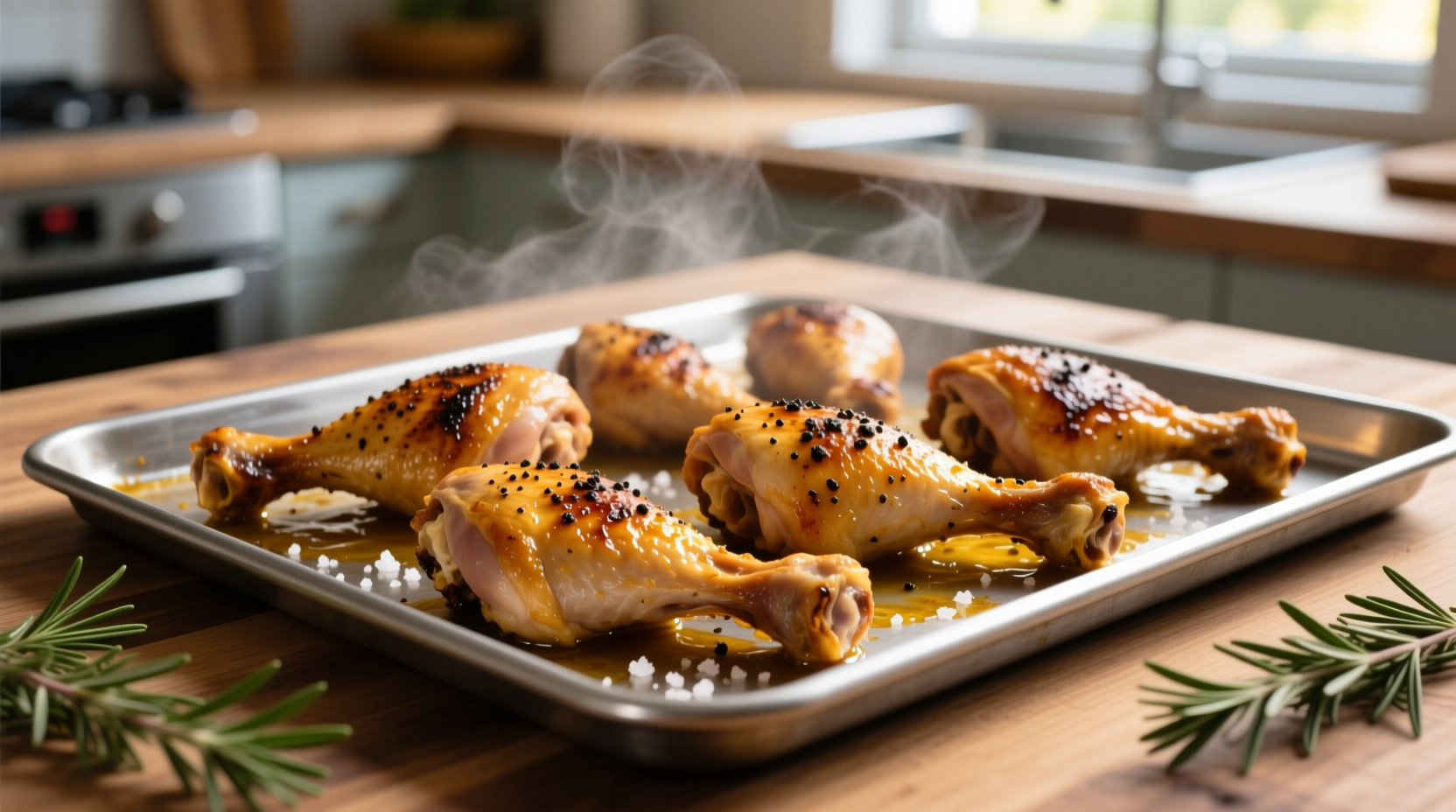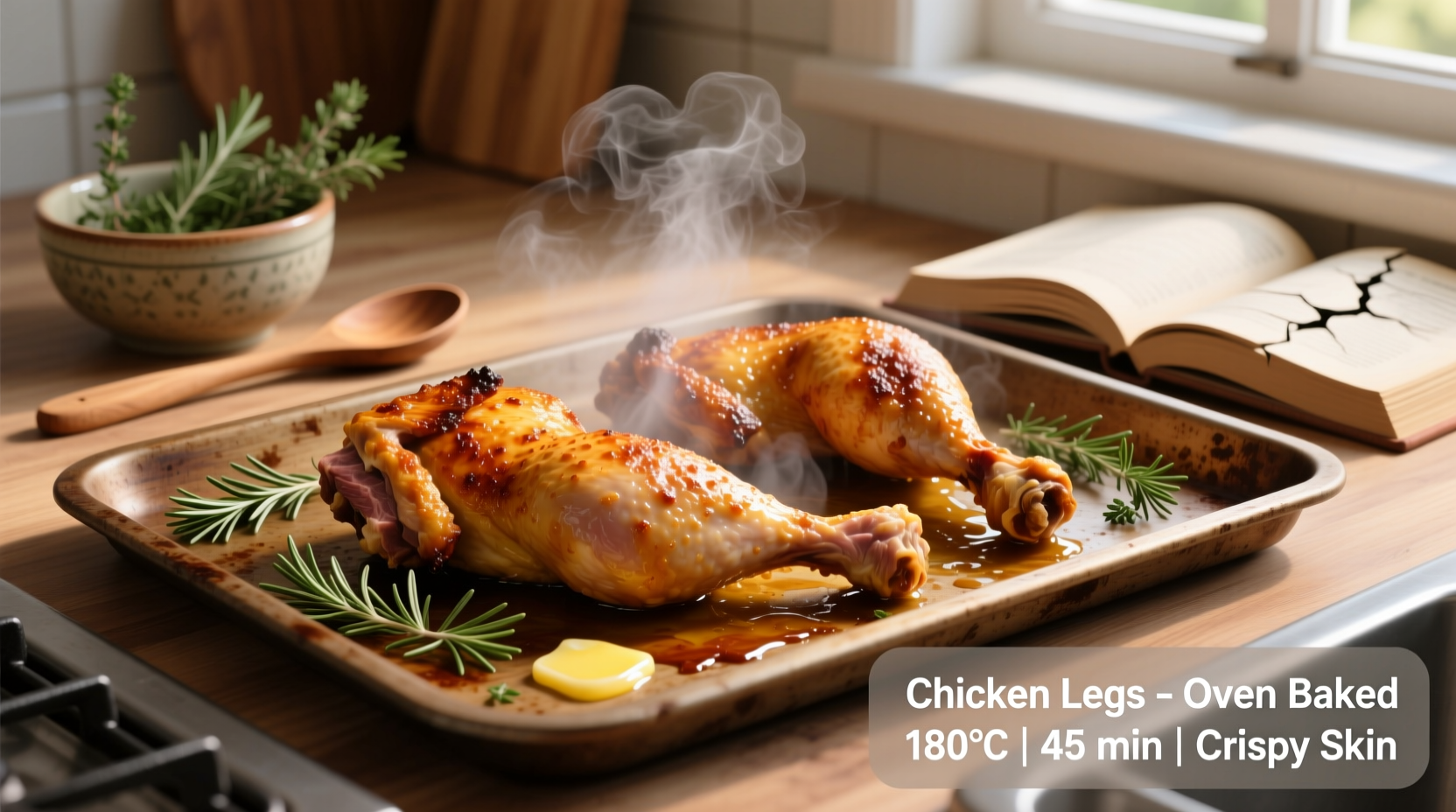Perfectly cooked oven-baked chicken legs reach an internal temperature of 165°F (74°C) after baking at 400°F (204°C) for 35-45 minutes. Pat dry, season generously, and arrange on a baking sheet with space between pieces for optimal crispiness. No flipping required for juicy, golden-brown results every time.
Discover the foolproof method for achieving restaurant-quality chicken legs in your home oven. This comprehensive guide delivers exactly what you need to know to transform simple drumsticks into a crispy-skinned, juicy centerpiece for any meal. Forget dry, bland chicken forever—our tested technique guarantees perfect results whether you're cooking for one or feeding a crowd.
Why Oven-Baked Chicken Legs Deliver Perfect Results
Chicken legs (both drumsticks and thighs) naturally contain more fat and connective tissue than breast meat, making them exceptionally forgiving in the oven. Their higher fat content ensures moisture retention during cooking, while the bone contributes flavor and helps maintain tenderness. Unlike delicate chicken breasts that easily dry out, legs provide a larger margin for error while still delivering succulent results.
| Cooking Temperature | Approximate Time | Best For |
|---|---|---|
| 375°F (190°C) | 45-55 minutes | Maximum tenderness, slower cooking |
| 400°F (204°C) | 35-45 minutes | Best balance of crisp skin and juicy meat |
| 425°F (218°C) | 30-40 minutes | Crispiest skin, slightly less tender |
Essential Preparation Steps for Success
Proper preparation makes the difference between good and exceptional oven-baked chicken legs. Follow these critical steps before your chicken ever touches the oven:
Dry Thoroughly for Crispy Skin
Remove chicken legs from packaging and pat completely dry with paper towels. Moisture is the enemy of crispy skin—this simple step dramatically improves browning. For even better results, place legs on a wire rack in the refrigerator uncovered for 1-4 hours before cooking.
Seasoning Strategy That Penetrates
Apply seasoning generously under the skin as well as on top. Lift the skin gently and rub seasoning directly onto the meat. This technique ensures flavor reaches the most important part—the meat itself—rather than just coating the surface. For maximum flavor development, season at least 30 minutes before cooking, or up to 24 hours in advance and refrigerate.

Step-by-Step Baking Instructions
1. Preheat and Prepare Baking Sheet
Preheat your oven to 400°F (204°C). Line a rimmed baking sheet with aluminum foil for easy cleanup, then place a wire rack on top. The rack elevates the chicken, allowing hot air to circulate completely around each piece for even cooking and maximum crispiness.
2. Arrange Chicken Properly
Place chicken legs on the rack with at least 1 inch of space between each piece. Crowding causes steaming rather than roasting, resulting in soggy skin. If necessary, use two baking sheets instead of overcrowding one.
3. Bake Without Disturbance
Place in the preheated oven and bake for 35-45 minutes without opening the oven door. Resist the urge to flip or check—this maintains consistent heat. After 30 minutes, check internal temperature in the thickest part (avoiding bone) using an instant-read thermometer.
4. Verify Proper Doneness
Chicken legs are fully cooked when they reach 165°F (74°C) internally, as verified by the USDA Food Safety and Inspection Service. The skin should be deep golden brown and crisp, and juices should run clear when pierced. Legs may appear slightly pink near the bone—that's normal with darker meat and doesn't indicate undercooking.
Flavor Variations to Try
Once you've mastered the basic technique, experiment with these flavor profiles that work exceptionally well with chicken legs:
Classic Herb Roasted
Mix 2 tablespoons olive oil with 1 tablespoon each chopped rosemary, thyme, and sage, plus 2 minced garlic cloves. Rub under skin and over chicken before baking.
Spicy Paprika
Combine 2 tablespoons smoked paprika, 1 teaspoon cayenne (adjust to taste), 1 tablespoon garlic powder, and 1 teaspoon onion powder. Toss chicken in mixture before baking for deep red color and complex heat.
Lemon Pepper
Rub chicken with 2 tablespoons cracked black pepper, zest of 2 lemons, 2 minced garlic cloves, and 2 tablespoons olive oil. Add lemon slices to the baking sheet for aromatic steam.
Avoid These Common Mistakes
Even experienced cooks sometimes make these errors that compromise results:
- Skipping the dry step: Wet chicken = steamed skin instead of roasted
- Overcrowding the pan: Prevents proper air circulation needed for crispiness
- Opening the oven too often: Each time you open the door, temperature drops 25-50°F
- Not using a thermometer: Visual cues alone aren't reliable for food safety
- Cutting immediately: Resting allows juices to redistribute—skip this and lose moisture
Proper Resting and Serving
Remove chicken from oven and let rest 5-10 minutes before serving. This critical step allows juices to redistribute throughout the meat. During resting, the internal temperature will rise another 5-10 degrees (carryover cooking), ensuring perfect doneness without overcooking.
Serve with simple sides that complement without overwhelming: roasted vegetables, mashed potatoes, or a fresh green salad. The natural richness of chicken legs pairs beautifully with acidic elements like lemon wedges or a vinegar-based slaw to cut through the fat.
Storage and Reheating Tips
Store leftovers in an airtight container in the refrigerator for up to 3-4 days. For best results when reheating:
- Oven method: 350°F (177°C) for 10-15 minutes until heated through
- Air fryer: 325°F (163°C) for 5-8 minutes for revived crispiness
- Avoid microwave: Makes skin soggy and heats unevenly
Freeze cooked chicken legs for up to 3 months. Thaw overnight in refrigerator before reheating. Never refreeze previously frozen cooked chicken.











 浙公网安备
33010002000092号
浙公网安备
33010002000092号 浙B2-20120091-4
浙B2-20120091-4